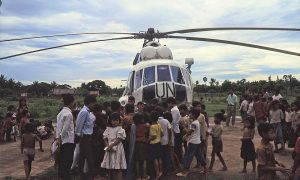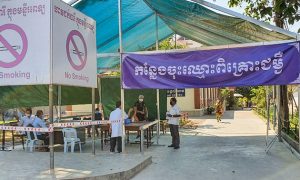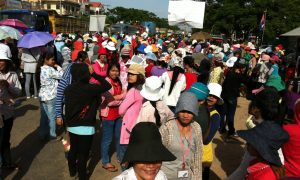Click here to go to read in Khmer
The tragic Cambodian history that marred the end of the 20th century gave way to remarkable and sustained growth in the kingdom’s economy, society, and political arena. In many ways, Cambodia’s livelihood was driven by the change of regime facilitated by the Paris Peace Agreement (PPA).
Within the prior uncertainty, the external factor of the international arena had considerable influence on domestic politics in Cambodia. During the Cold War a civil war in Cambodia took place. This has been referred to as a proxy war resulting from the Cold War blocs. It came to an end officially in 1991 on the signing of the PPA.
Flash back to the kingdom’s history, after the Khmer Rouge regime had been overthrown, and the future of the Cambodian people was unclear – their lives were marred by political disagreement among major groups. Four factions competed for leading rule: the State of Cambodia (which controlled the majority of the territory); the Royalist party led by late King Norodom Sihanouk; the Khmer people’s liberation Front (KPNLF) by Son Sann; and Khmer Rouge.
As might be imagined, the process of peace restoration in Cambodia was not easy to achieve. At the invitation of the Government of the French Republic, a range of agreements were initiated on political settlement in Cambodia before the 1990s. This included two conferences that were established with the aim of achieving an internationally guaranteed comprehensive settlement between relevant state parties, restoring peace in Cambodia.
The first conference was held from 30 July to 30 August 1989 and the second was from 21 to 23 October 1991. States that participated in the conferences in Paris included Australia, Brunei Darussalam, Cambodia, Canada, the People’s Republic of China, the French Republic, the Republic of India, the Republic of Indonesia, Japan, the Lao People’s Democratic Republic, Malaysia, the Republic of the Philippines, the Republic of Singapore, the Kingdom of Thailand, the Union of Soviet Socialist Republics, the United Kingdom of Great Britain and Northern Ireland, the United States of America and the Socialist Republic of Viet Nam. Zimbabwe and Yugoslavia have also represented the Non-Aligned Movement at the first and second sessions, respectively.
The 23rd October 2021 marks the 30th anniversary of the PPA. The agreement brought considerable growth in the arenas of peace, stability, democratic constitution, democracy, economic growth, the roadmap of development, human rights, and the market economy system.
Of course, for commentators on this agreement there are competing considerations as to the most important of these outcomes.
For this author, peace has been the most essential element. This led to the door opening for foreign investment. The restoration of peace under the United Nations Transitional Authority in Cambodia (UNTAC) earned trust from foreign investors. In addition, under the agreement Cambodia reformed its economic system from a planned economy to a free-market system.
Article 56 – 1993 Constitution states that: The Kingdom of Cambodia adopts market economic system. The preparation and process of this economic system shall be determined by the law.
Shortly after the agreement was made, a Radio UNTAC broadcast in Khmer, reported on Cambodian’s livelihoods:
“After four factions and other countries had signed in Agreement, Comprehensive Political Settlement of the Cambodia Conflict, on 23 October 1991, we observed that there is significant progress everywhere. In the construction sector, hotels, restaurants, stores, public buildings are unbelievably well developed, especially buildings in Phnom Penh which some are repairing and few are under construction. This confirmed that Cambodians who live inside and outside as well as foreigners trusted peacebuilding process made by UNTAC”.
UNTAC Radio reporter added that “Since UNTAC’s arrival, around 200 companies have come to invest in Cambodia. Those companies are from 20 countries around the world and include China, Singapore, Thailand, the EU, American, and Japan. Under those investments, there have been more than 300 investment projects in hotel and hospitality, agriculture, drink, steel and cement companies, and natural resource extraction in Cambodia. An UNTAC economist stated that foreign direct investment will bring out an equal opportunity for Cambodia. It’s such basic for tax revenue in Cambodia. UNTAC is also responsible for making regulations in order to increase investment and ensure ongoing and better business environment.” (click here to download the transcript of this broadcast in Khmer)
The Cambodia dilemma: foreign affairs and human rights in tension
Instead of implementing tough trade restriction measures that affect ordinary Cambodians, the EU and US should reconsider its approach to engaging Cambodia on human rights.
The agreement also created an enabling environment for local business and foreign direct investment. Following the PPA, the International Committee on the Reconstruction of Cambodia (ICORC) agreed to the Declaration on the Habitation and Reconstruction of Cambodia. It was adopted to ensure a smooth transition from the rehabilitation to the reconstruction phase. The priority areas that continue to be a requirement under the ICORC are food security, health, housing, training, education, public utilities, and basic transport infrastructure. This body has partaken in a consultative group on conditions of reform, providing loan and grant financing for development.
As a result of economic reform and the enabling investment environment brought about by the 1991 agreements, there has been a considerable increase in investment, largely around agricultural, industry, and services sectors. The inflow of Foreign Direct Investment (FDI) increased from US$ 124 million (1993) to US$520 million (2009). Investment approval in 2019 reached to 9.40 billion US dollars. The size of firms was gradually growing. The number of small and medium enterprises (SMEs) in 1999 was around 25,000 and jumped to 36,000 in 2009.
Beside bringing Cambodia out of civil war, the PPA has also given Cambodia opportunities for its bilateral and multilateral trade regionally and globally. For instance, Cambodia was granted special trade status from the United States under the General System of Preference (GSP) in 1997. The GSP is the US trade program designed to promote economic growth in developing nations by providing preferential duty-free entry for up to 5,000 products to designated states and territories. In 2016 Cambodia exported nearly $179 million duty free to United States under the program. Since the PPA, Cambodia has also become a member of the ASEAN Free Trade Area, and a recognised member of the World Trade Organization (WHO).
Similarly, in 2001, the European Union (EU) granted Cambodia preferential trade conditions under the Everything But Arms (EBA) program. The EBA is one of the preferential trade arrangements under the EU Generalised Scheme of Preferences (GSP). It grants full duty-free, quota-free access into the EU market for all products except arms and ammunition for countries classified by the United Nations as Least Developed Countries. The EU is Cambodia’s largest trading partner, accounting for 45% of Cambodian exports in 2018. The EBA employed around 700,000 to 800,000 workers in the manufacturing sector. These preferential agreements operate on the condition of respect for human rights and labour rights.
In accordance with the Paris Peace Agreements, Cambodia adopted a democratic system which requires respect for human rights and other elements of democracy. The conditions of democracy and political stability brought about by UNTAC, allowed Cambodia to access regional and international trade opportunities.
Peace is a foundation for development, and the PPA has not only brought about peace to the Cambodian people, but it has also laid down clear milestones and mandates to reconstruct Cambodia in term of political and social reform, democratisation, foreign aid, and enabling a business and investment environment that fosters Cambodian welfare and well-being.
កិច្ចព្រមព្រៀងដែលបានបង្កើតមូលដ្ឋានគ្រឹះនិងបរិយាកាសអំណោយផល
សម្រាប់ការវិនិយោគបរទេសនៅកម្ពុជា
ដោយ៖ លី ស្រីស្រស់
ថ្ងៃទី២៤ ខែកញ្ញា ឆ្នាំ២០២១
ប្រវត្តិសាស្រ្តសោកនាដកម្មរបស់កម្ពុជាដែលបានបញ្ចប់នៅចុងសតវត្សរ៍ទី២០ បានផ្តល់នូវការរីកចម្រើនគួរឱ្យកត់សម្គាល់និងនិរន្តរភាពនៅក្នុងវិស័យសេដ្ឋកិច្ច សង្គមនិងនយោបាយរបស់ប្រទេសកម្ពុជា។ ដោយសារការណ៍នេះជីវភាពរស់នៅរបស់ប្រជាពលរដ្ឋខ្មែរមានភាពល្អប្រសើរដោយការផ្លាស់ប្តូររបបនយោបាយដែលជាលទ្ធផលនៃកិច្ចព្រមព្រៀងសន្តិភាពទីក្រុងប៉ារីស។
នៅក្នុងភាពមិនច្បាស់លាស់ពីមុន កត្តាខាងក្រៅនៃឆាកអន្តរជាតិមានឥទ្ធិពលគួរឱ្យកត់សម្គាល់ទៅលើនយោបាយក្នុងស្រុកនៅក្នុងប្រទេសកម្ពុជា។ ក្នុងអំឡុងសង្គ្រាមត្រជាក់ សង្គ្រាមស៊ីវិលនៅកម្ពុជាបានកើតឡើង។ សង្គ្រាមនេះត្រូវបានគេហៅថាសង្គ្រាមអាយ៉ងដែលបណ្តាលមកពីប្លក់សង្គ្រាមត្រជាក់។ សង្គ្រាមនេះបានបញ្ចប់ជាផ្លូវការនៅឆ្នាំ ១៩៩១ ដោយសារកិច្ចព្រមព្រៀងសន្តិភាពទីក្រុងប៉ារីស។
សូមរំលឹកឡើងវិញអំពីប្រវត្តិសាស្ត្ររបស់ព្រះរាជាណាចក្របន្ទាប់ពីរបបខ្មែរក្រហមត្រូវបានផ្តួលរំលំ អនាគតរបស់ប្រជាជនកម្ពុជាមានភាពមិនច្បាស់លាស់, ជីវិតរបស់ពួកគេត្រូវបានបំផ្លាញដោយការខ្វែងគំនិតគ្នាផ្នែកនយោបាយក្នុងចំណោមភាគីនយោបាយធំៗ។ ភាគីទាំងបួន ៤ បានប្រកួតប្រជែងគ្នាដើម្បីគ្រប់គ្រងដឹកនាំប្រទេស៖ ភាគីរដ្ឋកម្ពុជា (ដែលគ្រប់គ្រងទឹកដីភាគច្រើន), គណបក្សរាជានិយមដឹកនាំដោយសម្តេចនរោត្តម សីហនុ, ក្រុមអភិរក្សនិយមដឹកនាំដោយសម្តេច សឺនសាន, និងរណសិរ្សរំដោះជាតិ ប្រជាជនខ្មែរ (ខ្មែរក្រហម) ។
ជាការពិត ដំណើរការនៃការស្តារសន្តិភាពឡើងវិញនៅកម្ពុជាមិនងាយស្រួលទេ។ កិច្ចព្រមព្រៀងមួយចំនួនត្រូវបានផ្តួចផ្តើមឡើងស្តីពីការដោះស្រាយបញ្ហានយោបាយនៅកម្ពុជាមុនទសវត្សរ៍ឆ្នាំ ១៩៩០ ដោយសារតែការអញ្ជើញនិងរៀបចំរបស់រដ្ឋាភិបាលនៃសាធារណរដ្ឋបារាំង។ កិច្ចព្រមព្រៀងទាំងនោះរួមបញ្ចូលទាំងសន្និសីទចំនួនពីរដែលត្រូវបានបង្កើតឡើងក្នុងគោលបំណងសម្រេចឱ្យបាននូវការដំណោះស្រាយរួមមួយដែលមានការធានាជាអន្តរជាតិរវាងភាគីរដ្ឋពាក់ព័ន្ធ, ការស្តារសន្តិភាពនៅកម្ពុជាឡើងវិញ។
សន្និសីទទីមួយត្រូវបានរៀបចំឡើងចាប់ពីថ្ងៃទី ៣០ ខែកក្កដាដល់ថ្ងៃទី ៣០ ខែសីហាឆ្នាំ ១៩៨៩ និងលើកទី២ ចាប់ពីថ្ងៃទី ២១ ដល់ថ្ងៃទី ២៣ ខែតុលាឆ្នាំ ១៩៩១។ រដ្ឋដែលបានចូលរួមក្នុងសន្និសីទនៅ ប៉ារីសរួមមានប្រទេសអូស្ត្រាលី, ប្រ៊ុយណេដារូសាឡឹម, កម្ពុជា, កាណាដា, សាធារណរដ្ឋប្រជាមានិតចិន, សាធារណរដ្ឋបារាំង, សាធារណរដ្ឋឥណ្ឌា, សាធារណរដ្ឋឥណ្ឌូនេស៊ី, ជប៉ុន, សាធារណរដ្ឋប្រជាធិបតេយ្យប្រជាមានិតឡាវ, សាធារណរដ្ឋហ្វីលីពីន, សាធារណរដ្ឋសិង្ហបុរី, ព្រះរាជាណាចក្រថៃ, , សហរដ្ឋអាមេរិក, សហភាពសាធារណរដ្ឋសង្គមនិយមសូវៀត, ម៉ាឡេស៊ី, ចក្រភពអង់គ្លេសនិងអៀរឡង់ខាងជើង និងសាធារណរដ្ឋសង្គមនិយមវៀតណាម។ ប្រទេសហ្សីមបាវេក៏បានចូលរួមសន្និសីទតំណាងឱ្យចលនាមិនចូលបក្សសម្ព័ន្ធនៅវគ្គទីមួយ ហើយប្រទេសយូហ្គោស្លាវីបានចូលវគ្គទីពីរ។
ថ្ងៃទី ២៣ ខែតុលាឆ្នាំ ២០២១ គឺជាខួបទី ៣០ នៃកិច្ចព្រមព្រៀងសន្តិភាពទីក្រុងប៉ារីស ។ កិច្ចព្រមព្រៀងនេះបាននាំមកនូវការរីកចម្រើនគួរឱ្យកត់សម្គាល់ផ្នែកសន្តិភាព, ស្ថិរភាព, រដ្ឋធម្មនុញ្ញបែបប្រជាធិបតេយ្យ, លទ្ធិប្រជាធិបតេយ្យ, កំណើនសេដ្ឋកិច្ច, ផែនទីបង្ហាញផ្លូវនៃការអភិវឌ្ឍ, សិទ្ធិមនុស្សនិងប្រព័ន្ធសេដ្ឋកិច្ច ទីផ្សារសេរី។ ជាការពិត សម្រាប់អ្នកធ្វើអត្ថាធិប្បាយលើកិច្ចព្រមព្រៀងនេះ មានការគិតផ្សេងៗគ្នាអំពីសារៈសំខាន់បំផុតនៃលទ្ធផលទាំងនេះ។
សម្រាប់អ្នកនិពន្ធនេះ, សន្តិភាពគឺជាធាតុសំខាន់បំផុត។ សន្តិភាពនាំឱ្យមានការបើកទ្វារសម្រាប់ការ វិនិយោគបរទេស។ ការស្តារសន្តិភាពឡើងវិញក្រោមការគ្រប់គ្រងរបស់អាជ្ញាធរបណ្តោះអាសន្នរបស់ អង្គការសហប្រជាជាតិប្រចាំនៅកម្ពុជា (អ៊ុនតាក់) ទទួលបានការទុកចិត្តពីវិនិយោគិនបរទេស។ លើសពីនេះក្រោមកិច្ចព្រមព្រៀងនេះ, ប្រទេសកម្ពុជាបានធ្វើកំណែទម្រង់ប្រព័ន្ធសេដ្ឋកិច្ចរបស់ខ្លួនពីប្រព័ន្ធ សេដ្ឋកិច្ចផែនការទៅជាសេដ្ឋកិច្ចទីផ្សារសេរី។
មាត្រា ៥៦ នៃរដ្ឋធម្មនុញ្ញ ១៩៩៣ ចែងថា៖ ព្រះរាជាណាចក្រកម្ពុជាប្រកាន់យកប្រព័ន្ធសេដ្ឋកិច្ចទីផ្សារសេរី។ ការរៀបចំនិងដំណើរការនៃប្រព័ន្ធសេដ្ឋកិច្ចនេះត្រូវកំណត់ដោយច្បាប់។
មិនយូរប៉ុន្មានបន្ទាប់ពីមានកិច្ចព្រមព្រៀងសន្តិភាពទីក្រុងប៉ារីស, វិទ្យុអ៊ុនតាក់ជាភាសាខ្មែរបានរាយការណ៍អំពីជីវភាពរស់នៅរបស់ប្រជាជនកម្ពុជាថា៖
“បន្ទាប់ពីភាគីទាំងបួននិងប្រទេសដទៃទៀតបានចុះហត្ថលេខាលើកិច្ចព្រមព្រៀងស្តីពីដំណោះស្រាយនយោបាយរួមមួយនៃជម្លោះនយោបាយនៅកម្ពុជានៅថ្ងៃទី ២៣ ខែតុលាឆ្នាំ១៩៩១ យើងសង្កេតឃើញថាមានការរីកចម្រើនគួរឱ្យកត់សម្គាល់នៅគ្រប់ទីកន្លែង។ នៅក្នុងវិស័យសំណង់, ភោជនីយដ្ឋាន, ហាងលក់ទំនិញ, សណ្ឋាគារ, អគារសាធារណៈ មានការអភិវឌ្ឍយ៉ាងល្អមិនគួរឱ្យជឿជាពិសេសអគារនៅក្នុង ទីក្រុងភ្នំពេញដែលអគារខ្លះកំពុងជួសជុលនិងខ្លះទៀតកំពុងសាងសង់។ នេះបញ្ជាក់ថាប្រជាជនកម្ពុជាដែលរស់នៅក្នុងនិងក្រៅប្រទេសក៏ដូចជាជនបរទេសបានជឿជាក់លើដំណើរការកសាងសន្តិភាពដែលធ្វើឡើងដោយអ៊ុនតាក់” ។
អ្នកយកព័ត៌មានវិទ្យុអ៊ុនតាក់បានបន្ថែមថា “ចាប់តាំងពីការមកដល់របស់អ៊ុនតាក់មក មានក្រុមហ៊ុនប្រហែល ២០០ បានមកវិនិយោគនៅកម្ពុជា។ ក្រុមហ៊ុនទាំងនោះមកពីប្រទេសចំនួន ២០ នៅជុំវិញពិភពលោកហើយរួមមានប្រទេសចិន, សិង្ហបុរី, ថៃ, សហភាពអឺរ៉ុប, អាមេរិកនិងជប៉ុន។ ក្រោមការវិនិយោគទាំងនោះមានគម្រោងវិនិយោគជាង ៣០០ ក្នុងវិស័យសណ្ឋាគារនិងបដិសណ្ឋារកិច្ច, កសិកម្ម, ភេសជ្ជៈ, ក្រុមហ៊ុនដែកថែប និងស៊ីម៉ងត៍និងការទាញយកធនធានធម្មជាតិនៅកម្ពុជា។ សេដ្ឋវិទូអ៊ុនតាក់ម្នាក់បានបញ្ជាក់ថាការវិនិយោគផ្ទាល់ពីបរទេសនឹងនាំមកនូវឱកាសស្មើគ្នាសម្រាប់កម្ពុជា។ វាជាមូលដ្ឋានសម្រាប់ចំណូលពន្ធនៅកម្ពុជា។ អ៊ុនតាក់ក៏ទទួលខុសត្រូវផងដែរក្នុងការបង្កើតច្បាប់ដើម្បីបង្កើនការវិនិយោគនិងធានាបាននូវបរិយាកាសអាជីវកម្មដែលកំពុងដំណើរការនិងល្អប្រសើរជាងមុន”។
កិច្ចព្រមព្រៀងនេះក៏បានបង្កើតបរិយាកាសអំណោយផលសម្រាប់អាជីវកម្មក្នុងស្រុកនិងការវិនិយោគផ្ទាល់ពីបរទេស។ បន្ទាប់ពីកិច្ចព្រមព្រៀងសន្តិភាពទីក្រុងប៉ារីសគណៈកម្មាធិការអន្តរជាតិស្តីពីការកសាងកម្ពុជាឡើងវិញ (International Committee on the Reconstruction of Cambodia “ICORC”) បានយល់ព្រមលើសេចក្តីប្រកាសស្តីពីលំនៅដ្ឋាននិងការកសាងឡើងវិញរបស់កម្ពុជា។ កិច្ចព្រមព្រៀងនេះត្រូវបានអនុម័តដើម្បីធានាឱ្យមានការផ្លាស់ប្តូរដោយរលូនពីការស្តារនីតិសម្បទាទៅដំណាក់កាលការកសាងប្រទេសកម្ពុជាឡើងវិញ។ វិស័យអាទិភាពដែលបន្តជាតម្រូវការក្រោមគណៈកម្មាធិការអន្តរជាតិស្តីពីការ កសាងកម្ពុជាឡើងវិញ គឺសន្តិសុខស្បៀង, សុខភាព, លំនៅដ្ឋាន, ការបណ្តុះបណ្តាល, ការអប់រំ, សេវា សាធារណៈនិងហេដ្ឋារចនាសម្ព័ន្ធដឹកជញ្ជូនមូលដ្ឋាន។ ស្ថាប័ននេះបានចូលរួមក្នុងក្រុមពិគ្រោះយោបល់អំពីលក្ខខណ្ឌនៃកំណែទម្រង់, ការផ្តល់ប្រាក់កម្ចីនិងការផ្តល់ហិរញ្ញប្បទានឥតសំណងសម្រាប់អភិវឌ្ឍន៍។
ជាលទ្ធផលនៃកំណែទម្រង់សេដ្ឋកិច្ចនិងបរិយាកាសវិនិយោគដែលអាចបង្កើតបានដោយកិច្ចព្រមព្រៀងសន្តិភាពទីក្រុងប៉ារីសឆ្នាំ ១៩៩១ មានការកើនឡើងគួរឱ្យកត់សម្គាល់ក្នុងការវិនិយោគភាគច្រើនលើវិស័យកសិកម្មឧស្សាហកម្មនិងសេវាកម្ម។ លំហូរចូលនៃការវិនិយោគផ្ទាល់ពីបរទេសបានកើនឡើងពី ១២៤ លានដុល្លារអាមេរិក (១៩៩៣) ដល់ ៥២០ លានដុល្លារអាមេរិក (២០០៩) ។ ការអនុម័តវិនិយោគនៅឆ្នាំ ២០១៩ សម្រេចបានដល់ ៩,៤០ ប៊ីលានដុល្លារអាមេរិក។ ទំហំក្រុមហ៊ុនបានកើនឡើងជាលំដាប់។ ចំនួនសហគ្រាសធុនតូចនិងមធ្យមនៅឆ្នាំ ១៩៩៩ មានប្រមាណ ២៥.០០០ និងបានកើនឡើងដល់ចំនួន ៣៦.០០០ ក្នុងឆ្នាំ ២០០៩ ។
ក្រៅពីនាំកម្ពុជាចេញពីសង្រ្គាមស៊ីវិល កិច្ចព្រមព្រៀងសន្តិភាពទីក្រុងប៉ារីសក៏បានផ្តល់ឱកាសដល់កម្ពុជាក្នុងការធ្វើពាណិជ្ជកម្មទ្វេភាគីនិងពហុភាគីក្នុងតំបន់និងទូទាំងពិភពលោកផងដែរ។ ឧទាហរណ៍ប្រទេសកម្ពុជាត្រូវបានផ្តល់ឋានៈពាណិជ្ជកម្មពិសេសពីសហរដ្ឋអាមេរិកក្រោមប្រព័ន្ធអនុគ្រោះពន្ធទូទៅ (GSP) ក្នុងឆ្នាំ ១៩៩៧។ ប្រព័ន្ធអនុគ្រោះពន្ធទូទៅគឺជាកម្មវិធីពាណិជ្ជកម្មរបស់សហរដ្ឋអាមេរិកដែលបង្កើតឡើងដើម្បីលើកកម្ពស់កំណើនសេដ្ឋកិច្ចនៅក្នុងប្រទេសកំពុងអភិវឌ្ឍដោយផ្តល់ការអនុគ្រោះពន្ធដោយមិនគិតថ្លៃរហូតដល់ ផលិតផលចំនួន ៥,០០០ មុខទៅសហរដ្ឋអាមេរិកនិងដែនដីរបស់ខ្លួន។ នៅឆ្នាំ ២០១៦ កម្ពុជាបាននាំចេញទំនិញដោយមិនជាប់ពន្ធជិត ១៧៩ លានដុល្លារទៅសហរដ្ឋអាមេរិកក្រោមកម្មវិធីនេះ។ ចាប់តាំងពីមានកិច្ចព្រមព្រៀងសន្តិភាពទីក្រុងប៉ារីសមក ប្រទេសកម្ពុជាក៏បានក្លាយជាសមាជិកនៃតំបន់ពាណិជ្ជកម្មសេរីអាស៊ាននិងជាសមាជិកដែលទទួលស្គាល់របស់អង្គការពាណិជ្ជកម្មពិភពលោក។
ដូចគ្នានេះដែរនៅឆ្នាំ ២០០១ សហភាពអឺរ៉ុប (EU) បានផ្តល់លក្ខខណ្ឌអនុគ្រោះពាណិជ្ជកម្មដល់កម្ពុជាក្រោមកម្មវិធីអ្វីៗគ្រប់យ៉ាងលើកលែងតែអាវុធ (Everything But Arms “EBA”) ។ ប្រព័ន្ធអនុគ្រោះពន្ធ EBA គឺជាផ្នែកមួយនៃការរៀបចំពាណិជ្ជកម្មដែលមានអាទិភាពនៅក្រោមគ្រោងការណ៍អនុគ្រោះពន្ធទូទៅរបស់សហភាពអឺរ៉ុប។ វាផ្តល់ការនាំចូលដោយមិនជាប់ពន្ធ, មិនមានកំណត់កូតានាំចូលទៅក្នុងទីផ្សារសហភាពអឺរ៉ុបទាំងមូលសម្រាប់ផលិតផលទាំងអស់លើកលែងតែអាវុធនិងគ្រាប់រំសេវ សម្រាប់ប្រទេសដែលត្រូវបានចាត់ថ្នាក់ដោយអង្គការសហប្រជាជាតិថាជាប្រទេសមានការអភិវឌ្ឍតិចបំផុត។ សហភាពអឺរ៉ុបគឺជាដៃគូពាណិជ្ជកម្មធំបំផុតរបស់កម្ពុជាដែលស្មើនឹង ៤៥% នៃការនាំចេញរបស់កម្ពុជានៅឆ្នាំ ២០១៨។ EBA បានផ្តល់ការងារឱ្យកម្មករប្រមាណពី ៧០០០០ ទៅ ៨០០០០ នាក់នៅក្នុងវិស័យផលិតកម្ម។ កិច្ចព្រមព្រៀងអាទិភាពទាំងនេះដំណើរការលើលក្ខខណ្ឌនៃការគោរពសិទ្ធិមនុស្សនិងសិទ្ធិការងារ។
អនុលោមតាមកិច្ចព្រមព្រៀងសន្តិភាពទីក្រុងប៉ារីស ប្រទេសកម្ពុជាបានប្រកាន់យករបបប្រជាធិបតេយ្យដែលតម្រូវឱ្យមានការគោរពសិទ្ធិមនុស្សនិងធាតុដទៃទៀតនៃលទ្ធិប្រជាធិបតេយ្យ។ លក្ខខណ្ឌនៃលទ្ធិប្រជាធិបតេយ្យនិងស្ថិរភាពនយោបាយដែលនាំមកដោយអ៊ុនតាក់បានអនុញ្ញាតឱ្យកម្ពុជាទទួលបាន ឱកាសពាណិជ្ជកម្មក្នុងតំបន់និងអន្តរជាតិនិងដើម្បីជំរុញកំណើនសេដ្ឋកិច្ចរបស់ខ្លួនប្រចាំឆ្នាំប្រមាណ ៧ ភាគរយ។
សន្តិភាពគឺជាមូលដ្ឋានគ្រឹះនៃការអភិវឌ្ឍ ហើយកិច្ចព្រមព្រៀងសន្តិភាពទីក្រុងប៉ារីសមិនត្រឹមតែនាំមកនូវសន្តិភាពដល់ប្រជាជនកម្ពុជានោះទេ ប៉ុន្តែវាក៏បានដាក់ចេញនូវដំណាក់កាលនិងអាណត្តិច្បាស់លាស់ក្នុងការកសាងប្រទេសកម្ពុជាឡើងវិញក្នុងអំឡុងពេលកំណែទម្រង់នយោបាយនិងសង្គម, ប្រជាធិបតេយ្យ, ជំនួយបរទេសនិងការធ្វើឱ្យមានបរិយាកាសធុរកិច្ចនិងការវិនិយោគដែលលើកកម្ពស់សុខសុវត្ថិភាពនិងសុខុមាលភាពរបស់ប្រជាពលរដ្ឋខ្មែរ៕
 Facebook
Facebook  Twitter
Twitter  Soundcloud
Soundcloud  Youtube
Youtube  Rss
Rss 



